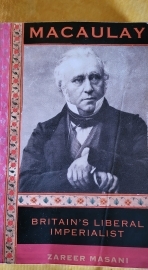The man who helped make English a language of India
THOMAS BABINGTON MACAULAY (1800-1859) was a genius, a reformer, a historian, an impressive and persuasive orator, a voracious reader, and a politician (Whig party). He was actively involved in abolishing the slave trade, emancipating the Roman Catholics and the Jewish people in Britain, and extending the right to vote. Yet despite his liberal views and actions, he was what many people might consider ‘politically incorrect’ by today’s standards. For example, even though he promoted the rights of Jewish people, he was quite anti-Semitic. As far as voting was concerned, he wanted to expand the electorate but only to those whose education was above a certain standard.

Macaulay spent several years in India, working for the East India Company and the British Government. He was disdainful of the long tradition of Hindu literature, customs, and knowledge. He felt that the way forward for the Indian Subcontinent lay in providing the Indians with what he considered to be the superior knowledge of Western (European) science, philosophy, and other aspects of life. To this end, he encouraged the teaching of English to Indians so that they could ‘enjoy’ the benefits of Western ‘civilisation’.. It is largely due to his efforts in promoting teaching of English, and other subjects in English, that today English is a flourishing language ( a ‘lingua franca’) in India and other parts of the Subcontinent..
An Indian academic Zareer Masani (1947-2024) has written a superbly detailed biography of Macaulay. Called “Macaulay”, this biography skilfully recounts the life of this fascinating man. It is a scholarly but highly readable account of a brilliant man who achieved a great deal and whose life was not free of contradictory traits. With regard to Macaulay’s encouragement of the use of English in India, Masani wrote that Macaulay was much admired by BR Ambedkar, who was born a Dalit and worked to improve the lot of Dalits. He was also the author of the Constitution of Independent India. Ambedkar, who admired Macaulay, benefitted from Macaulay’s encouragement of Western education as opposed to the revival of Indian nationalist traditions. Without Western education, which Macaulay insisted was to be made available to all Indians regardless of their religion or caste, BR Ambedkar, coming from humble background, might never have had the excellent educational opportunities he enjoyed.
I can strongly recommend this book. It was a joy to read.



